The Best Transportation Management Systems
Streamline your logistics supply chain with transportation management systems for truckers, freight brokers, and carriers. We reviewed the top platforms for essential features such as real-time tracking, route optimization, and seamless carrier management.
- Responsive customer service
- Supports dispatch, billing, safety management
- Supports both carriers and brokerers in one system
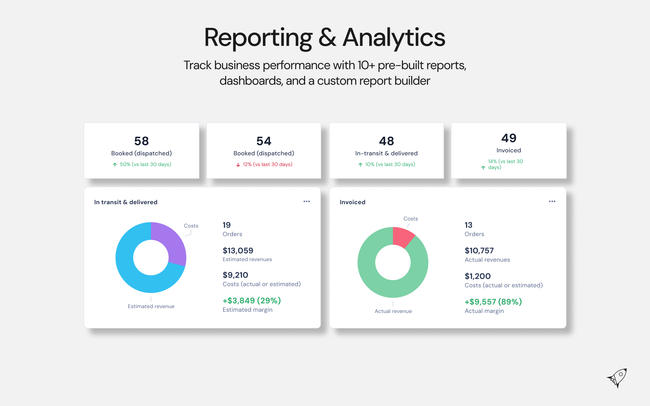
- Powered by the Network TMS
- Track and trace shipments
- Monitors ETA of in-transit orders live
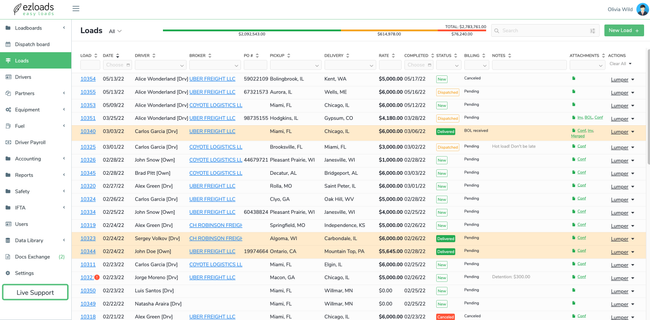
- User-friendly load data entry
- Saves contact data for easy dispatching and customer records
- Effectively calculates driver settlements
Transportation management systems (TMS) help plan and optimize the physical movement of goods across land, sea, and sky. Using our advanced review methodology, our team has carefully evaluated these platforms to find the best options for brokers, carriers, and freight forwarders.
- Alvys: Unified Carrier-Broker Platform
- Rose Rocket: Best Order Automation Module
- ezLoads TMS: Great Mobile App
- Axon: Best for Trucking
- Blue Yonder: Strong Supply Chain Planning
- MercuryGate TMS: Open Standard Architecture
- TruckMaster EnVision: Strong Dispatching Tools
- DAT Broker TMS: Best Load Management Tool
- AscendTMS: An Affordable Option
- Descartes Aljex: Most User-Centric Design
Alvys - Unified Carrier-Broker Platform
Alvys combines carrier and brokerage operations together in a unified platform. This makes it ideal for hybrid businesses managing both fleets and external carrier partnerships. That’s because its interface allows you to seamlessly toggle between roles, giving you quick access to tracking, dispatching, rate confirmations, and accounting tools.
By consolidating fleet and brokerage data, Alvys simplifies tasks like reporting and billing; at the same time, it supports flexible load assignments between company trucks and third-party carriers. This streamlined approach allows you to control costs and improve delivery timelines. It can also help you maintain the flexibility needed to adapt to shifting demand.
Alvys also lets you manage every step of a load’s journey with drag-and-drop dispatching, document management, and even real-time driver communication. Drivers can receive shipment details and pickup and delivery times via the Alvys app. This reduces dispatcher workload and helps improve customer communication, ensuring your hybrid operations stay responsive and aligned.
Rose Rocket - Best Order Automation Module
Rose Rocket’s order automation module helps carriers and brokers alike ensure timely fulfillment and deliveries. You can upload documents in PDF format, or forward them right from your email in just a few clicks. This can save you a ton of time manually entering information and ensures accuracy. The system even saves recurring orders, so you don’t need to enter the same info every time.
Additionally, Rose Rocket supports Electronic Data Interchange (EDI), so you can receive inbound orders and send outbound confirmations. While it can take some time to set up preferences for each customer, it helps make transactions and communications smooth for EDI-based businesses. The system supports several document types, including:
- 204: Load Tender (incoming orders)
- 990: Load Tender Response (accept/reject)
- 210: Invoice (outgoing billing)
- 214: Load Status Update (real-time shipment visibility)
Rose Rocket’s order automation tools integrate with the rest of its all-in-one suite, including modules like CRM and carrier management. It supports all types of logistics businesses, including freight brokers, 3PLs, carriers, and even hybrid carriers and fleets. Pricing starts at $233/month, though it requires a custom quote for exact costs.
ezLoads TMS - Great Mobile App
ezLoads TMS’s mobile app connects drivers to the TMS, allowing them to update load statuses and submit scanned Proof of Delivery (POD) or other receipts directly into the ezLoads TMS. It’s an all-in-one trucking solution that handles all the DOT safety compliance requirements and documents for drivers and equipment. This software keeps track of all expiration dates so you can remain compliant with all regulations.
With ezLoads, driver settlements are prepared in seconds. DS is emailed to a driver right from the system. Invoicing is done in just one click. Invoices can be sent directly to customers from ezLoads’ system. IFTA is done in one click. Since all miles and gallons are already in the system, ezLoads gives an IFTA report in just one click.
Axon - Best for Trucking
Axon’s accounting module is specifically designed for the trucking industry and helps increase cash flow. The accounts receivable tool automatically updates invoicing and driver pay when trips and orders are entered. This allows you to receive payment as soon as possible after a trip is completed.
The accounts payable section automatically matches fuel and expenses to the carrier, maintaining accurate expense records. You can generate reports with drill-down capabilities into key metrics such as cost-per-mile and miles-per-gallon to identify inefficiencies. It even includes payables EDI order tenders, streamlining payment communications between carriers.
Additionally, Axon’s accounting module offers real-time financial analysis. You can easily analyze reports like profit/loss statements, cash flow, and balance sheet statements. The system also offers unlimited custom reporting so you can analyze metrics specific to your company. These can include load profitability analysis, IFTA, or maintenance expenses by vehicle or fleet, giving you full control over your trucking finances.
Blue Yonder - Strong Supply Chain Planning
Blue Yonder, previously known as JDA Demand Planning, is a supply chain planning software emphasizing transportation, warehouse, labor, and distribution networks. Predictive scenario planning grants your company complete visibility into automation and control practices.
Planning, logistics, and commerce come together with Blue Yonder Luminate. Each helps you better manage your supply chain operations with features like demand planning, transportation management, and merchandise operations.
MercuryGate TMS - Open Standard Architecture
Built on open-standard architecture, MercuryGate enables adapters to all major ERP and warehouse management systems. Users can customize the software to their specific needs without specialized integrations and readily scale it to meet changing demands.
MercuryGate TMS combines power and accessibility to create a feature-rich yet easy-to-use transportation management system. The platform fully automates the transportation lifecycle and is used by top-tier third-party logistics providers (3PLs), shippers, brokers, carriers, and freight forwarders.
TruckMaster EnVision - Strong Dispatching Tools
TruckMaster EnVision includes several automation tools for seamlessly dispatching fleets. You can connect EDI pathways, import purchase orders, and create templates to eliminate manual load entry. Also, you can store freight rates for each carrier, so you don’t have to re-enter them for every new route. This helps you save time and reduce data entry errors.
Additionally, EnVision integrates with many third-party GPS tracking partners, so you can track every outgoing shipment. Quickly see on-time delivery statuses, and if a load is delayed, the system automatically notifies you and the customer. This gives you complete visibility into your freight—even for complex loads like cross-docking or split.
EnVision also includes several other modules, including brokerage, billing, maintenance, safety, and accounting. It’s best for small to midsize trucking, 3PL shippers, and freight brokers looking for a total fleet management system.
Pricing for the Lite version is $75/month plus $0.25 per completed job. For the full cloud offering, pricing starts at $400/month for the first two users, and $75 for each additional user. On-premise prices start at $5,000/user one-time. A free demo is available for the Lite version.
DAT Broker TMS - Best Load Management Tool
The single-entry, automated load management system in DAT Broker TMS saves time by pre-populating data for recurring shippers. Integrated with DAT RateView, this tool lets you quickly analyze lane pricing and post loads to multiple boards or private networks in one click. Any changes to the order auto-sync across carriers and shippers, making communication seamless without any manual input on your end.
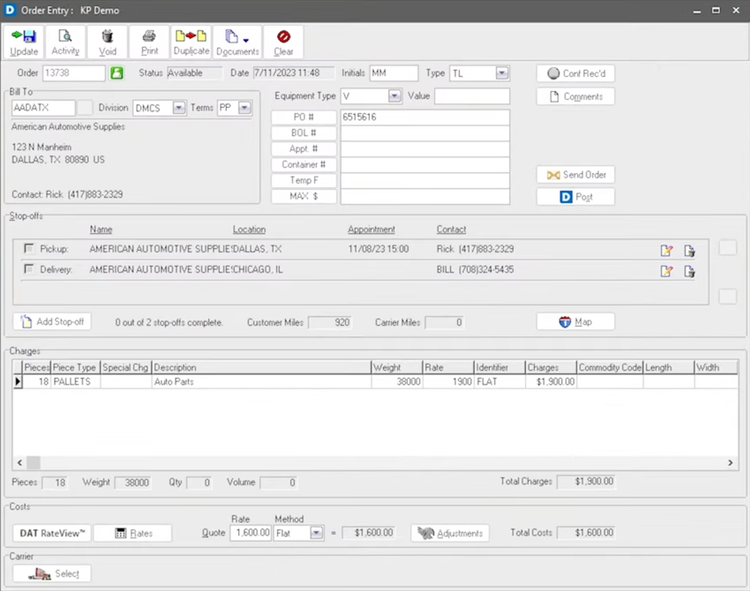
Beyond load posting, DAT helps you re-engage carriers by searching lane histories, pulling info like performance grades, rates, and contact details. This TMS software automatically qualifies carriers via CarrierWatch, importing DOT, insurance, and safety data to safeguard your brokerage operations.
DAT Broker TMS even lets you dispatch loads from a centralized screen, with tools to sort by state and due date. Built-in tracking tools refresh load statuses twice daily, helping you bolster customer trust by sharing real-time progress.
Starting at $100/month, this transportation software best serves small to medium brokerages with anywhere from 10 to 100 employees. It’s designed for intermediaries in the shipping business, though it can also help smaller 3PLs focused more on brokering freight than warehouse management.
Find pricing details and key features on our DAT Broker TMS profile page.
AscendTMS - An Affordable Option
With flat rate pricing starting at $49/user/month, AscendTMS is a cost-effective choice for small to medium-sized transportation companies. The accounting module, included in the Basic plan, helps cut down on overhead even more with tools like commission tracking, invoicing, and billing.
This system automatically calculates commission schedules, saving you time and reducing any potential disputes down the road. You can also manage carrier payments based on agreed terms for each load. Plus, this TMS software supports custom pay items, like detention fees or fuel surcharges, so it’s flexible for a wide range of brokerage agreements. This improves your cash flow by reducing the likelihood of delayed customer payments.
Additionally, AscendTMS calculates gross profit and margins per load, giving you a clear view of profitability per transaction. This gives budget-conscious businesses visibility into their bottom line, vital when operating on thin margins or negotiating rates in tight markets. However, the Basic plan does not offer full analytics insights, outbound EDI load tenders, or document management; for these tools, you’ll need to upgrade to the Premium or Pro plans.
Descartes Aljex - Most User-Centric Design
Descartes Aljex features a user-centric design and cloud-based nature that make learning easier for new users. The dashboard-driven TMS is popular with freight brokers, 3PLs, shippers, and intermodal users operating across the North American logistics supply chain. Descartes Aljex offers accounting, customer and carrier management, operations, utilities, and administration features.
Other Systems We Like
McLeod LoadMaster is another solid TMS designed for truckload carriers and fleets. The full suite includes functions such as driver management, dispatch, and telematics for GPS routing. It combines these with back-office capabilities like billing and EDI. This makes it well-suited for midsize companies that need a complete system.
What Is Transportation Management Software?
Transportation management software (TMS) plans, executes, and optimizes the physical movement of goods. Interchangeably referred to as “trucking software” in some sectors, TMS is a subset of supply chain management systems and is either used as its own system or as part of a larger ERP software package. Unlike standardized packages, TMS addresses the specific needs of the transportation industry with customized functionality to help companies operate across the land, sea, and sky.
Key Features
Broadly speaking, TMS software offers several functions to help distributors and transportation companies coordinate, calculate, and maintain shipments, shippers, and vehicles. Some of the most common TMS functionalities include the following:
| Feature | Functionality |
|---|---|
| Accounting | Take care of all your specific accounting needs, including invoice reconciliation and matching, pricing, freight billing and auditing, carrier rates, and other general accounting tasks to establish and ensure proper and correct payments. |
| Order management | Streamline order processing by fulfilling orders across multiple channels and ensuring timely delivery. |
| Invoicing and pricing | Shippers can fully calculate the delivery costs through TMS based on many different factors, including the distance, cargo weight, and mode of shipment. TMS offers in-depth reporting and analysis to help shippers determine the best and most cost-effective shipment methods. |
| Route optimization | Part of transportation execution, find fuel and time-efficient routes for your shippers by analyzing maps, traffic information, speed limits, modal limits, and fuel cost. |
| Load management | Determine the best carrier for each delivery and help consolidate shipments into the most efficient loads possible. |
| Fleet management | Maintain a complete fleet of vehicles, with functionality including procurement, payment, disposal, costing, and valuation, along with advanced functionality like driver and service record management, mapping and route optimization, and location history. |
| Maintenance management | Oversee a fleet’s maintenance workflow, implement a preventative maintenance plan, review tire conditions, order spare parts, and stay on top of a repair schedule. |
| Compliance management | Use recording and reporting modules to comply with the latest DOT regulations. |
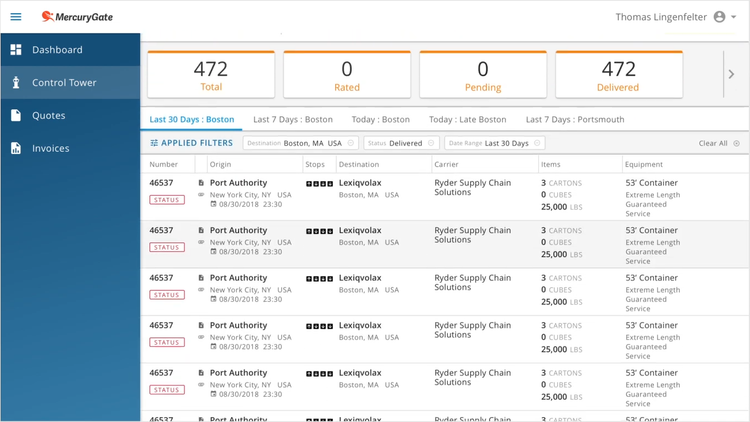
Primary Benefits
Organizations that deal with logistics know shipping a package isn’t as simple as placing a box on a truck and sending it off to a destination. Across the supply chain, moving goods throughout the globe is a serious business that requires detailed monitoring, reporting, and insights throughout the entire process. For logistics companies, having the right software to manage shipping and transportation is crucial to ensuring items get where they need to go as efficiently as possible.
Fortunately for freight brokers, carriers, and trucking companies, transportation management software provides multiple benefits by:
- Updating fuel costs: The freight audit and payment component of the TMS can keep track of fuel prices between your contracted agreement and current fuel indices, ensuring you don’t overpay for such a volatile resource.
- Meeting regulatory compliance: Transportation is one of the world’s most heavily regulated industries. TMS can ensure your organization is compliant by accurately recording regulated tasks like driver hours worked, fuel tax payments and surcharges, vehicle maintenance schedules, and other common restrictions.
- Lowering costs: It may seem counterintuitive, but investing in better TMS can help logistics companies save money in the long run through better resource management.
- Automating data entry: Rather than relying on users’ recording information by hand, leading to human error, TMS can enable automatic logging and tracking to reduce the potential for user error.
- Optimizing routes: Route optimization leads to reduced fuel costs, faster deliveries, and better turnaround times on orders.
- Automating fleet and maintenance management: Use preemptive measures to lower overall downtime from maintenance and unexpected repair costs.
- Providing real-time, remote access: Gain access to your transportation tools from anywhere in the world with cloud-based TMS software. Mobile apps make it possible to track drivers and shipments on-the-go.
- Organizing document management: Cut down on physical paperwork (i.e. scheduling spreadsheets) and digitize your records.
Depending on your business, implementing an all-in-one transportation management solution may offer many more benefits. For example, modern TMS platforms enhance user experience and support with intuitive interfaces, customizable dashboards, and predictive alerts to streamline operations. Extensive training resources improve adoption, collectively boosting user productivity.
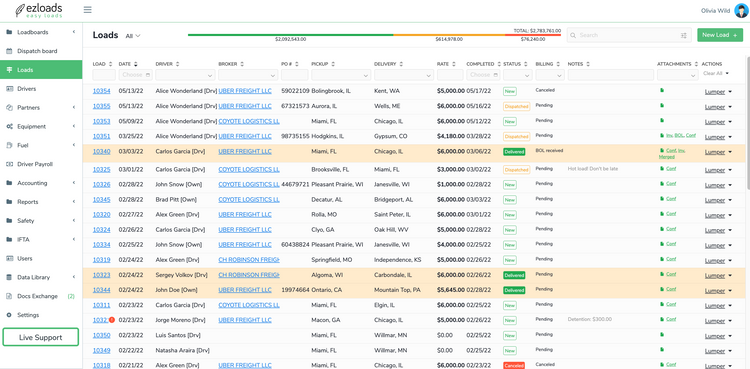
Pricing Guide
Transportation management software pricing varies based on the number of users and the exact functionality you need. Cloud-based SaaS plans typically range from $49 to $233 per month, with some enterprise plans being higher. Some plans additionally charge per user. One-time purchases of perpetual licenses range from $650 to $20,000. Here’s a general breakdown of what you can expect to pay based on your company size:
Low-Tier
- Company Size: 1-25 employees
- Fleet Size: 1-20 trucks, 1-40 trailers
- Average Yearly Cost: $500-$5,000 per year
- Product Examples: Alvys, Rose Rocket, EZLoads, DAT Broker TMS, AscendTMS, FreightPOP
Mid-Tier
- Company Size: 25-100 employees
- Fleet Size: 20-100 trucks, 40-200 trailers
- Average Yearly Cost: $5,000-$25,000 per year
- Product Examples: Descartes Aljex, Axon Trucking Software
High-Tier
- Company Size: 100-500 employees
- Fleet Size: 100-500 trucks, 200-1,000 trailers
- Average Yearly Cost: $25,000-$100,000 per year
- Product Examples: MercuryGate TMS, Blue Yonder Luminate, Manhattan TMS
Enterprise
- Company Size: 500+ employees
- Fleet Size: 500+ trucks, 1,000+ trailers
- Average Yearly Cost: $100,000+ per year
- Product Examples: Oracle Transportation Management, SAP Transportation Management, JD Edwards EnterpriseOne
If you’re on a budget or just starting out, there are options to meet your budget. There are some free-forever TMS solutions available, though many TMS vendors offer free trials and demos. Both perpetual licenses and SaaS subscriptions may charge extra for continued maintenance, user training, and add-on functionality.
Market Trends
Some of the latest trends to consider when looking to buy transportation management software include:
- Standalone TMS vs. enterprise resource planning software functionality: Your organization may be considering a standalone TMS, but there are several ERP software packages that include similar functionality. The right choice for your business will depend on the scale of your transportation operations.
- Cloud vs. on-premise: Cloud technology enables logistics companies to access their data anywhere. The modern TMS is cloud-ready, making your trucking software more capable and smarter than ever before.
- The emergence of driverless technology: Self-driving trucks are already on the horizon. These will require new and complex software solutions to oversee a fleet of virtual drivers. Switching to a modern TMS can future-proof your system as technology evolves.
QuickBooks Upgrade Options
As one of the leading accounting software solutions, QuickBooks is the choice for many different industries, including transportation. Most trucking or TMS systems offer full integration, with QuickBooks acting as the core accounting program and TMS features handled through add-ons or integrations. A QuickBooks TMS integration is a great option for organizations seeking to stick with QuickBooks while enhancing their TMS capabilities.

















































